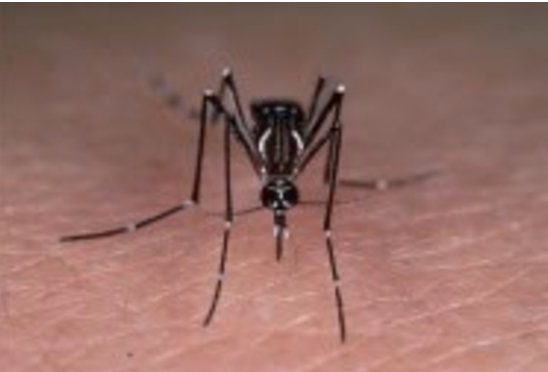Description
Material provided: Whole mosquitoes, dissected tissues, or extracts
Unit definition: 50 infected females (25 if dissected) supplied as 100 fully-engorged females with infection prevalence at least 50%
Vector information
Family: Culicidae
Genus: Aedes
Species: Aedes aegypti
Strain Name: PAEA
Place of origin: Paea, Tahiti (French Polynesia)
Date of colonisation: 1994
Virus information
Pathogens used for infection: Chikungunya virus
Reference: EVAg catalog 001v-EVA83
ICTV Taxonomy: ssRNA(+) / Togaviridae / Alphavirus / Chikungunya virus
Virus name: Chikungunya virus
Geographical origin: La Reunion island
Strain: UVE/CHIKV/2006/RE/LR2006_OPY1
Genotype: ECSA
Sequencing: Complete genome
Infectivity: Infectivity tested and quantified
Mycoplasmic content: Mycoplasma free
Genbank reference: DQ443544
Production protocol
1-week-old females are fed on an infectious blood-meal using the Hemotek® system. The titer of infectious blood-meals is 107 PFU/mL. After the infectious blood-meal, engorged females are transferred to small containers and fed with 10% sucrose in a chamber maintained at 28°±1°C, a 16h: 8h light: dark cycle and 80% humidity until day 7 post-infection. Products shipped under non-infectious conditions.
Product options
Please specify in your request:
Time post-infection: Please specify one time point in days post-infection (dpi) to harvest the samples. The most common options are primary midgut infection (3 dpi) or disseminated infection (7 or 14 dpi), but other times are possible by request, contact us.
Whole or dissected: Instead of 50 whole mosquitoes, material can be supplied from dissected material harvested at the appropriate time point: 25 dissected midguts or 25 dissected salivary glands or 25 dissected ovaries, provided with the corresponding carcasses.
Form of material:
- Whole mosquitoes or dissected tissues, fixed in 70% ethanol, formalin, or other fixative validated for virus inactivation: useful for DNA extraction from 70% ethanol, immunohistochemistry, not useful for RNA experiments or proteomics. Shipped as non-infectious material.
- Whole mosquitoes or dissected tissues, homogenised in a lysis buffer such as Trizol validated for virus inactivation: useful for RNA, DNA and protein experiments. Shipped as non-infectious material.
- Whole mosquitoes or dissected tissues, frozen at -80°C or stored in RNALater that do not efficiently inactivate virus: useful for RNA, DNA and protein experiments. Shipped as infectious material.
- Other formats or preparations may be possible by request, contact us.
Production conditions: Material is generated using default virus dose and incubation temperature used by the supplying facility. Other conditions may be possible upon request, contact us.
Sample size and replicates: For larger sample sizes, request more units. If requesting multiple units, please clearly specify the purpose (biological replicates, larger sample size, or other). Biological replicates (e.g., for RNAseq transcriptional profiling experiments) require independent infections, while a larger sample size of the same material requires infecting additional mosquitoes on the same infectious blood.
Publications
- Vazeille-Falcoz M, Mousson L, Rodhain F, Chungue E, Failloux AB. 1999. Variation in oral susceptibility to dengue type 2 virus of populations of Aedes aegypti from the islands of Tahiti and Moorea, French Polynesia. American Journal of Tropical Medicine and Hygiene 60: 292-299.
- Schuffenecker I, Iteman I, Michault A, et al. (2006) Genome microevolution of Chikungunya viruses causing the Indian Ocean outbreak. PLoS Medicine, 3, e263.
For more information, please contact us

